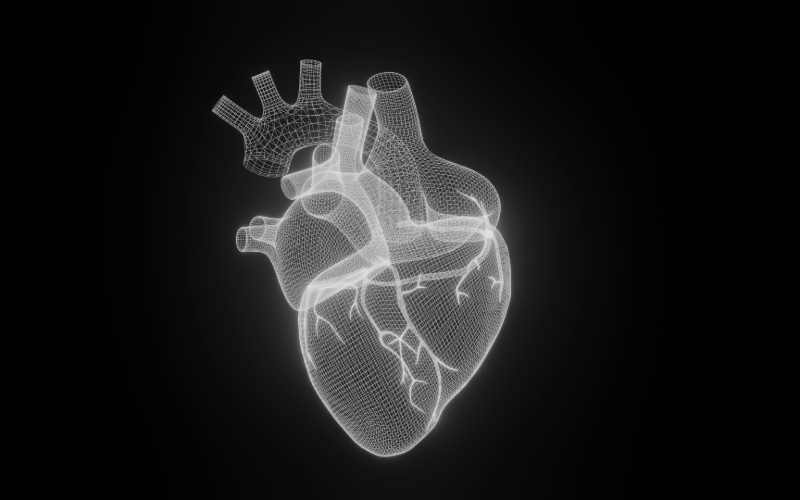
AI heart disease
Heart disease is the leading cause of death worldwide. Detecting it early can make the difference between life and death, as cardiovascular diseases (CVD) are often asymptomatic in the early stages. Today, artificial intelligence (AI) is transforming how doctors and healthcare systems approach the early identification of these conditions, offering faster, more accurate and personalized methods.
What is Heart Disease and Why is it Difficult to Detect?
Heart disease is a disease of the heart and blood vessels. The most common include:
- Coronary heart disease
- Hypertension
- Heart failure
- Arrhythmias
Detecting them early is a challenge, as they often do not show clear symptoms. Conventional techniques such as electrocardiogram (ECG) and stress tests help in detection, but are limited when the disease has not developed enough to be evident on these tests. This is where artificial intelligence comes in, offering a more comprehensive assessment.
How Does AI Work in Heart Disease Detection?
Artificial intelligence, particularly through the use of machine learning and deep learning algorithms, processes large amounts of medical data. These include:
- Electrocardiogram data
- Heart MRIs
- Personal and family health data
- Ultrasound images
- Lifestyle and physical activity information
AI analyzes this data and looks for patterns that might go unnoticed by humans. For example, machine learning algorithms can identify mild arrhythmias or subtle changes in the structure of the heart that could be early signs of possible heart disease.
AI Methods for Identifying Heart Disease
1. Medical Image Analysis: AI is able to identify irregularities in MRIs and CT scans with high accuracy. Deep learning enables algorithms to detect abnormalities in images and calculate the thickness of heart walls, the presence of calcifications, or signs of hypertrophy.
2. Interpretive ECG: An AI-interpreted ECG analyzes every aspect of the heart rhythm. Advanced AI models can detect signs of diseases such as atrial fibrillation, tachycardia, and other arrhythmias, even when they are imperceptible in a manual interpretation.
3. Data-Driven Predictive Algorithms: AI uses health data and risk factors to predict the likelihood of heart disease in the future. This includes analysis of factors such as age, BMI, cholesterol level, family history and lifestyle.
4. Continuous Monitoring with Wearable Devices: Wearable devices, such as smart watches, collect data on heart rate, blood pressure and blood oxygen levels. AI analyzes this data and sends alerts when it detects suspicious patterns.
Advantages of Using AI in Heart Disease Detection
- Early Detection: AI makes it possible to identify early signs of heart disease, which increases the chances of effective intervention and treatment.
- Accuracy in Diagnosis: By reducing the margin of error in diagnosing heart disease, AI minimizes false positives and negatives.
- Continuous Monitoring: With wearable devices, AI can monitor the patient in real time and provide immediate alerts.
- Saving Time and Resources: AI allows doctors to assess and prioritize high-risk patients more quickly, improving efficiency in the healthcare system.
Real Cases and Successes in Detecting Heart Disease with AI
Some notable examples include:
- Google Health and Mayo Clinic have developed algorithms that identify heart disease from MRI scans.
- Apple introduced an ECG feature in its Apple Watch that detects signs of atrial fibrillation. This feature has proven crucial in the early detection of heart problems.
- Johns Hopkins is using AI to identify changes in the structure of the heart that could indicate the risk of heart failure in asymptomatic patients.
Challenges and Ethical Considerations
Despite its benefits, AI in cardiology faces significant challenges. Data quality, patient privacy, and the possibility of bias in algorithms are all issues of concern. For these systems to work effectively and ethically, they must comply with privacy and transparency regulations in handling sensitive data.
Future of AI in Heart Disease Detection
With the development of more sophisticated algorithms and broader access to medical data, AI is poised to become an essential tool in the prevention and detection of cardiovascular diseases. In the near future, AI is likely to not only enable faster and more accurate diagnoses, but also be able to predict the risk of heart disease at even earlier stages, forever changing the paradigm of preventive cardiology.
AI is revolutionizing the diagnosis and treatment of heart disease, enabling early detection and more effective risk management. Collaboration between physicians and advanced technologies is improving the prognosis of thousands of patients, giving them the opportunity to receive treatment before it is too late. This revolution, still in progress, promises a healthier future and a more effective fight against heart disease.
